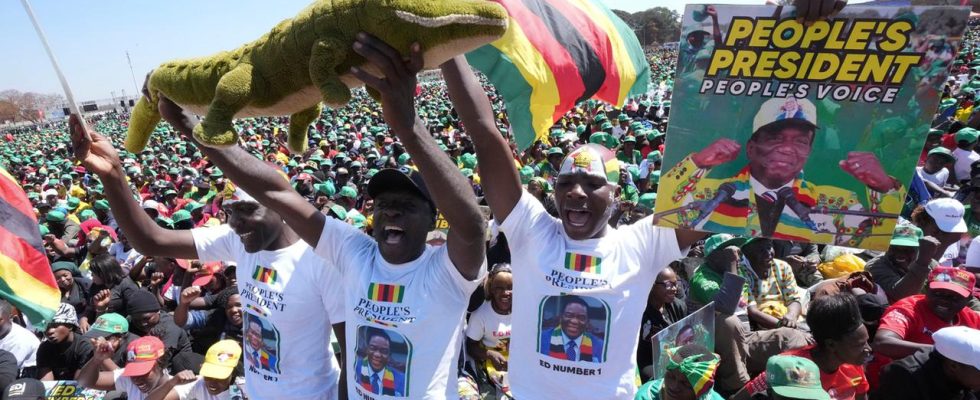The same party has governed since Zimbabwe gained independence in 1980. She has run down the former granary, critics in the grip. Now are presidential elections. Does the opposition have a chance?
The era of the Robert Mugabe government is history – and yet seemingly endless. Emmerson Mnangagwa had stood by the long-term dictator for decades before succeeding him as president.
Mnangagwa has led Zimbabwe since 2018, but the population’s initial hopes for a better life have not been fulfilled. Now the 80-year-old, who was already known as “the crocodile” as a fighter against British colonial rule, is standing for a second term.
At his campaign rallies, Mnangagwa claimed that his party, ZANU-PF, was “Zimbabwe’s only mainstream party” and that it had “unparalleled mobilization and organizational skills”.
However, his party has not had many successes. There has been an economic crisis in Zimbabwe for years, inflation is high and the cost of living is rising continuously.
Mnangagwa’s nickname “the crocodile” arouses many associations – but they have little to do with the idea of a democratic leader.
“This election is botched”
The largest opposition party, the “Citizens Coalition for Change”, or CCC for short, claims to be in favor of change. She accuses the governing ZANU-PF of corruption and mismanagement. Its chairman, the 45-year-old presidential candidate Nelson Chamisa, sounds confident of victory: CCC will form the next government, that’s how he perceives the mood among the population: “People are fed up with this old system, they want a new, honest one Government.”
But you don’t hear much criticism – especially because of new legislation. In a nutshell, it reads: Anyone who criticizes the ruling party is a criminal.
This leads to self-censorship by many institutions and organizations, complains Siphosami Malunga from the NGO Open Society Africa, among others:
There are draconian laws that criminalize everything that is normally protected by the constitution. You can’t speak your mind, you can’t criticize the government. If you do, you’re breaking the law, you’re hurting the country. This election is irrevocably and irretrievably botched.
Nelson Chamisa, candidate and chairman of the CCC, is confident of victory – observers consider the outcome of the election to be a foregone conclusion.
The ruling party manipulated voter lists and took control of the electoral commission. All of these factors would make the election unfree, unfair and completely illegitimate, says Malunga.
The think tank International Crisis Group takes a similar view: the experts are certain that ZANU-PF wants to remain in power at all costs.
campaign with chicken thighs
The allegations go further. Barbra Bhebe from the independent think tank Election Resource Center in Zimbabwe’s capital Harare has evidence of vote-buying: A lot of money went into the election campaign, she said. Political parties, especially the ruling party, bought votes. For example, if you go to a ZANU-PF campaign event, you’re lucky enough to get two chicken thighs with fries and a drink, says Bhebe.
The opposition criticized that their campaign events were disrupted. Party members were repeatedly subjected to reprisals. Human rights organizations confirm this. Idriss Nassah from the human rights organization Human Rights Watch says: “What worries us is that opposition politicians have been threatened, arrested and imprisoned. There are cases where political opponents have been intimidated and attacked.”
Dozens of CCC supporters were taken in a truck to a court in Harare in August for allegedly organizing an illegal rally.
hope for a peaceful election outcome
Before the turn of the millennium, Zimbabwe was one of the economically strongest countries in Africa. The landlocked country in southern Africa with 16 million inhabitants was once considered the breadbasket of the continent. Poverty, hunger, shortages of supplies, power cuts and decay now dominate. Young people are desperately looking for work and hope for improvement after the election.
One million first-time voters are among the 6.6 million people who have registered to vote. Many hope for a better life after the vote. Above all, they hope that everything will be peaceful. After the last elections in 2018, demonstrators demonstrated against alleged electoral fraud. Soldiers shot at people – six died, 35 were injured.

